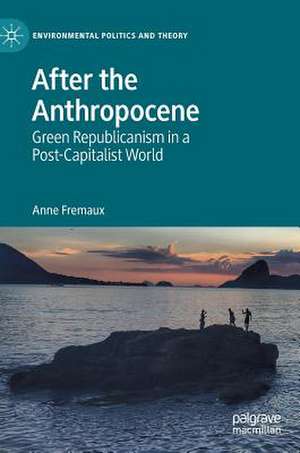After the Anthropocene: Green Republicanism in a Post-Capitalist World: Environmental Politics and Theory
Autor Anne Fremauxen Limba Engleză Hardback – 2 apr 2019
The environmental crisis is the most prominent challenge humanity has ever had to battle with, and humanity is currently failing. The Anthropocene—or so called ‘age of humans’—is indeed a period when the survival of humanity has never been so much at risk. This book locates itself in the field of critical green political theory. Fremaux's analysis of the current environmental crisis calls for us to embrace radical shifts in our modes of being; or, in other words, socially progressive innovations that will be described within the unique framework of "Green Republicanism." In offering a constructive and emancipatory delineation of what could be considered an ecological civilization that is respectful of its natural environment and social differences, this book describes how to shift from an ‘arrogant speciesism’ and materialistic lifestyle to a post-anthropocentric ecological humanism focusing on the ‘good life’ within ecological limits. This new political regime calls for a radical reinvention of our societies, a decentering of the humans within our metaphysical worldview, and a withdrawal of the capitalist technosphere at the benefit of the biosphere. It will require a new economic paradigm that replaces the unsustainable capitalist logic of growth by sustainable degrowth and steady economics. Rooted in ethical thinking and political philosophy, this book seeks to offer a concrete roadmap of how sustainable societies can be fostered.
Preț: 504.48 lei
Preț vechi: 593.51 lei
-15% Nou
Puncte Express: 757
Preț estimativ în valută:
96.53€ • 100.99$ • 80.19£
96.53€ • 100.99$ • 80.19£
Carte tipărită la comandă
Livrare economică 02-16 aprilie
Preluare comenzi: 021 569.72.76
Specificații
ISBN-13: 9783030111199
ISBN-10: 3030111199
Pagini: 269
Ilustrații: XXVII, 316 p. 10 illus., 3 illus. in color.
Dimensiuni: 148 x 210 x 28 mm
Greutate: 0.56 kg
Ediția:1st ed. 2019
Editura: Springer International Publishing
Colecția Palgrave Macmillan
Seria Environmental Politics and Theory
Locul publicării:Cham, Switzerland
ISBN-10: 3030111199
Pagini: 269
Ilustrații: XXVII, 316 p. 10 illus., 3 illus. in color.
Dimensiuni: 148 x 210 x 28 mm
Greutate: 0.56 kg
Ediția:1st ed. 2019
Editura: Springer International Publishing
Colecția Palgrave Macmillan
Seria Environmental Politics and Theory
Locul publicării:Cham, Switzerland
Cuprins
1. Introduction.- 2. A Critical Examination of the Naturalistic Narrative of the Anthropocene.- 3. The ‘Return of Nature’ in The Capitalocene: Against the Ecomodernist Version of the ‘Good Anthropocene’.- 4. For a Post-Anthropocentric Socio-Nature Relationship in the Anthropocene.- 5. A new Green Political Economy for the Anthropocene.- 6. A Post-Liberal Green Republican Democracy for the Anthropocene.- 7. Conclusion.
Notă biografică
Anne Fremaux completed her PhD at the School of Politics, International Studies and Philosophy at Queen’s University Belfast, Ireland. Her publications include La nécessité d'une écologie radicale. La pensée à l'épreuve des problèmes environnementaux (2011) and L’Ère du levant (2016).
Textul de pe ultima copertă
The environmental crisis is the most prominent challenge humanity has ever had to battle with, and humanity is currently failing. The Anthropocene—or so called ‘age of humans’—is indeed a period when the survival of humanity has never been so much at risk. This book locates itself in the field of critical green political theory. Fremaux's analysis of the current environmental crisis calls for us to embrace radical shifts in our modes of being; or, in other words, socially progressive innovations that will be described within the unique framework of "Green Republicanism." In offering a constructive and emancipatory delineation of what could be considered an ecological civilization that is respectful of its natural environment and social differences, this book describes how to shift from an ‘arrogant speciesism’ and materialistic lifestyle to a post-anthropocentric ecological humanism focusing on the ‘good life’ within ecological limits. This new political regime calls for a radical reinvention of our societies, a decentering of the humans within our metaphysical worldview, and a withdrawal of the capitalist technosphere at the benefit of the biosphere. It will require a new economic paradigm that replaces the unsustainable capitalist logic of growth by sustainable degrowth and steady economics. Rooted in ethical thinking and political philosophy, this book seeks to offer a concrete roadmap of how sustainable societies can be fostered.
Caracteristici
Provides a critical approach of mainstream theories of the Anthropocene Develops a new postanthropocentric/ecocentric approach based on Earth Jurisprudence Offers a critical standpoint of ecomodernism














